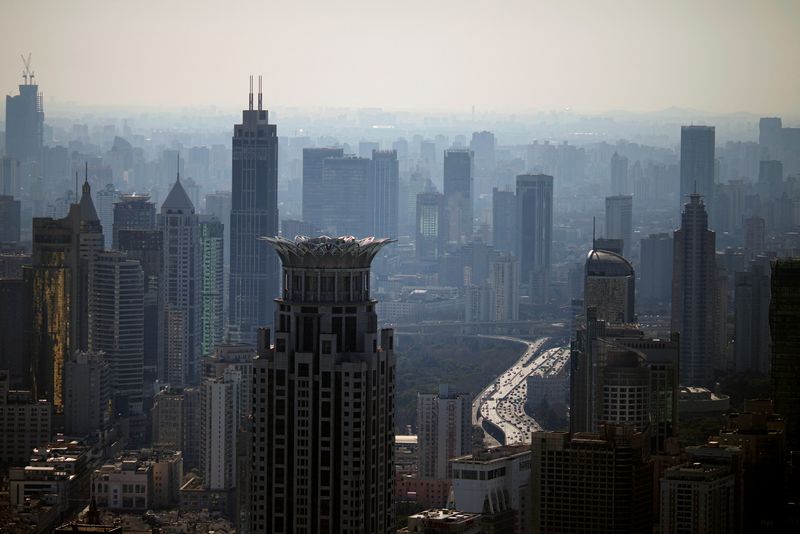(Reuters) - Top Chinese cities Shanghai and Shenzhen are planning to lift key remaining restrictions on home purchases to attract potential buyers and shore up their flagging real estate markets, four sources with knowledge of the matter said.
Under the planned changes, potential buyers will no longer have to be vetted for eligibility and people from other places in China will be allowed to buy homes in the popular cities, which had been previously tightly controlled due to worries about excess speculation.
Shanghai, China's commercial and financial hub, and Shenzhen, the country's answer to Silicon Valley, will also seek to scrap limits on the number of homes that people can buy, said three of the sources.
Both cities are expected to announce the changes in the coming weeks, joining a growing list of Chinese cities that have completely abolished purchase restrictions over the past year in a bid to revive demand in the crisis-hit sector, they added.
All the sources requested anonymity as they were not authorized to speak to the media.
China's State Council Information Office, which handles media queries on behalf of the government, and the Ministry of Housing did not immediately respond to Reuters' request for comment.
The governments of Shanghai, Shenzhen and Beijing also did not respond to queries.
Shanghai and Shenzhen started to impose limits on people buying homes in 2011 and 2010, respectively, in an effort to cool soaring prices.
The planned easing comes after Chinese leaders pledged on Thursday at a Politburo meeting to strive to achieve the 2024 economic growth target of roughly 5% and halt declines in the housing market, state media reported.
The moves, if implemented, would mark the latest effort by Chinese policymakers to arrest the prolonged downturn in the struggling real estate sector, which has weighed heavily on growth in the world's second-largest economy.
They would follow broader-than-expected monetary stimulus and property market support measures announced by the central bank on Tuesday, which include liquidity injections and interest rate cuts, aimed at restoring confidence in the economy.
China's CSI 300 Real Estate Index, which rose 7.8% in the morning session on Friday, extended gains after the Reuters report. The index closed up 8.28%.
PROPERTY CRISIS
As part of the latest measures, the capital Beijing is also considering lifting similar restrictions across most areas of the city in phases over the longer-term, with the exception of key districts such as Xicheng and Dongcheng, which host China's top leadership compound Zhongnanhai and various government office buildings, according to two of the sources.
China's property sector slipped into a debt crisis in mid-2021, which resulted in many developers defaulting on their repayment obligations and running out of money to finish apartment construction.
The sector's woes are straining the financial system and weighing heavily on consumer spending and confidence.
Authorities have been ramping up efforts to stabilize the troubled sector since 2022. However, many of the previous policies have either been piecemeal in nature or have had only a limited, short-term effect.
Prices for new homes in China fell at their fastest rate in over nine years in August, according to official data, indicating previous measures had failed to put a floor under the market, let alone spur a meaningful recovery.
For years, China's so-called tier-one cities, including Beijing, Shanghai and Shenzhen, have imposed restrictions on home purchases by non-local buyers as a key rule to control local housing prices.
These regulations require buyers without hukou, or residency permits, to pay social insurance and income tax for a certain number of years before they can buy homes.
Shanghai, a city of 25 million people, has since May relaxed its restrictions for non-Shanghai buyers by reducing the required years of social insurance and income tax payments before they become eligible.
The city has also scrapped restrictions on home purchases by divorced couples.
Beijing and Shenzhen, home to tech giants such as Tencent and Huawei, have also eased some home purchase restrictions, allowing some homebuyers to "swap" to a new home from an old one.

Earlier this year, a few Chinese cities like Hangzhou, capital of wealthy Zhejiang province, and Jinan and Qingdao, large cities in China's second-most populous province of Shandong, lifted all curbs on home purchases.
The major southern city of Guangzhou in January became the first to fully relax home purchase limits on large properties - those with a floor area of more than 120 square metres.